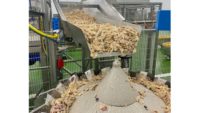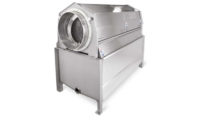Tulip Food Company is a leading Danish processed food producer. At its Svenstrup plant in the northern part of the country, the company produces about 90 tons of sausages each day. Approximately two-thirds (20) of its production lines uses modified-atmosphere packaging (MAP) of carbon dioxide and nitrogen to keep the product fresh and improve its shelf life.
Because its prior MAP gas-flushing system did not have automatic adjustment capability, it was brought to Tulip’s attention that significant quantities of gas were being wasted. In addition, manual samples were being taken at frequent intervals to ensure the correct mixture was being introduced into the packages. This required more time, resulted in destructive package testing and incurred labor costs.
In an effort to improve efficiency and cut costs, Tulip invested in technology from MAP specialist Dansensor. The MAP Check 3 gas analyzer and MAP Mix Provectus gas mixer were installed on four of the company’s packaging lines.
In tandem, these units provide constant gas content monitoring and automatic adjustment of the gas flow for improved quality and reduced cost of operation. They also log quality assurance data, including information such as the gas content and consumption. MAP-critical data can be stored in the units or a central database.
The impact of the new system has been impressive, says company engineer Thomas Jensen. “We have reduced gas consumption on these four lines by 30 to 40 percent, which reduces our costs by the same amount. In addition, we have been able to reduce our manual sampling by about half. This means that employees who are responsible for the sampling also can take on more productive plant activities,” Jensen says.
Another key benefit is the system software, which enables automatic data logging. “This is a very useful feature,” says Jensen. “We can look into the computer to see all the data for a day or a week or a month. If we do get a query from a customer we can go into the system and find where the problem occurred and how many packages may have been affected. This is not possible with the manual testing process.”
The data also supports Tulip’s process control initiatives. “When we show our customers the system, we can demonstrate that we have very close control over the process, with all the relevant information easy to obtain and to check back on,” Jensen says. “The system is simple to operate, with only a couple of days needed to train staff.”
“Overall, we are very pleased with the Dansensor analysis and mixing system,” Jensen says. “It is simple to operate, it saves us money directly by using less gas, it saves us time on manual testing and not having to write things down on paper, and it gives us a very accurate computer record.”




Report Abusive Comment